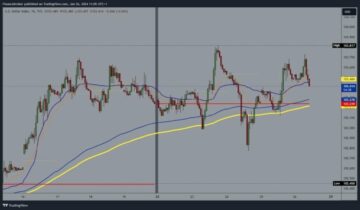Oil prices have always been sensitive to geopolitical tensions, and recent events in the Middle East have underscored this reality. Just a day after rallying more than 4%, oil prices dipped on Tuesday as traders nervously monitored military clashes between Israel and the Palestinian Islamist group Hamas. Brent crude dropped 36 cents to $87.79 a barrel, and U.S. West Texas Intermediate (WTI) crude eased 35 cents to $86.03 a barrel. While these fluctuations may seem routine in the world of oil trading, the current situation carries significant implications for the global energy landscape.
The Geopolitical Chessboard and Oil Prices
The primary concern gripping oil markets right now is the potential for supply disruptions due to the ongoing military clashes in the Middle East. Hamas initiated a significant military assault on Israel, leading to a series of air strikes and heightened tensions. While Israel’s crude oil production is relatively modest, the region is a vital artery for global oil supply. Disruptions in the Middle East could have far-reaching consequences for oil prices, and traders are keeping a close watch. The mere threat of supply interruptions has led to a cautious approach in the market, with oil trading at a risk premium.
Israel’s Role in the Equation
Although Israel itself produces limited crude oil, it plays a strategic role in global energy markets due to its location. The conflict has already caused the shutdown of Israel’s port of Ashkelon and its oil terminal, raising concerns about potential supply bottlenecks. The possibility of the conflict spreading and affecting other oil-rich nations in the region is even more alarming. The situation highlights the interconnectivity of geopolitical events and the energy sector.
The Iran Factor
One of the wildcard factors in this situation is Iran. While there is no concrete intelligence or evidence linking Iran directly to the attacks, the mere suspicion of its involvement has significant implications. If the United States does find evidence implicating Iran, we could witness a swift reduction in Iran’s oil exports. This could further tighten an already constrained oil market. The potential for stricter oil sanctions against Iran looms large, adding an element of uncertainty to oil trading. Iran’s role in this unfolding drama is one that traders are closely following.

The Road Ahead: Oil Prices and Beyond
Amid the turmoil, analysts are making predictions about the future of oil prices. An energy analyst, Vivek Dhar, believes that Brent oil will ultimately stabilise between $90-$100 per barrel in the fourth quarter of 2023. However, the ongoing Palestine-Israel conflict raises the risk of Brent futures tracking at $100 per barrel and even higher. These forecasts indicate the fragile balance in global oil markets and how geopolitical events can tilt that balance.
The recent dip in oil prices following a rally highlights the ever-present influence of geopolitical tensions on the energy sector. The situation in the Middle East, with the Palestine-Israel conflict at its core, has injected a sense of caution into oil trading. The potential for supply disruptions, the role of Iran, and the predictions for oil prices all underscore the intricate relationship between global politics and the oil market. As traders navigate these turbulent waters, the keyword remains clear: “trade oil” holds not just financial implications but also geopolitical significance, emphasising the critical role oil plays on the global stage.
- SEO Powered Content & PR Distribution. Get Amplified Today.
- PlatoData.Network Vertical Generative Ai. Empower Yourself. Access Here.
- PlatoAiStream. Web3 Intelligence. Knowledge Amplified. Access Here.
- PlatoESG. Carbon, CleanTech, Energy, Environment, Solar, Waste Management. Access Here.
- PlatoHealth. Biotech and Clinical Trials Intelligence. Access Here.
- Source: https://www.financebrokerage.com/how-geopolitical-tensions-impact-global-oil-markets/
- :has
- :is
- :not
- 2023
- 35%
- 36
- a
- About
- adding
- affecting
- After
- against
- ahead
- AIR
- All
- already
- also
- always
- an
- analyst
- Analysts
- and
- approach
- ARE
- AS
- At
- Attacks
- Balance
- been
- believes
- between
- bottlenecks
- brent
- Brent Crude
- but
- CAN
- caused
- caution
- cautious
- clear
- Close
- closely
- Concern
- Concerns
- conflict
- Consequences
- constrained
- Core
- could
- critical
- crude
- Crude oil
- Current
- day
- Dip
- directly
- disruptions
- does
- Drama
- dropped
- due
- East
- element
- energy
- Even
- events
- evidence
- exports
- factors
- far-reaching
- financial
- Find
- fluctuations
- following
- For
- forecasts
- Fourth
- further
- future
- Futures
- geopolitical
- Global
- Group
- Have
- heightened
- higher
- highlights
- holds
- How
- However
- HTTPS
- if
- Impact
- implications
- in
- indicate
- influence
- initiated
- Intelligence
- Intermediate
- into
- intricate
- involvement
- Iran
- Israel
- IT
- ITS
- itself
- jpg
- just
- keeping
- keyword
- landscape
- large
- leading
- Led
- Limited
- linking
- location
- Making
- Market
- Markets
- May..
- mere
- Middle
- Middle East
- Military
- modest
- monitored
- more
- Nations
- Navigate
- no
- now
- of
- Oil
- oil markets
- oil-rich
- oil-rich nations
- on
- ONE
- ongoing
- or
- Other
- per
- plato
- Plato Data Intelligence
- PlatoData
- plays
- politics
- possibility
- potential
- Predictions
- Premium
- Prices
- primary
- produces
- Production
- Quarter
- raises
- raising
- rally
- Reality
- recent
- reduction
- region
- relationship
- relatively
- remains
- right
- Risk
- road
- Role
- routine
- s
- Sanctions
- sector
- seem
- sense
- sensitive
- Series
- shutdown
- significance
- significant
- situation
- Spreading
- Stage
- States
- Strategic
- stricter
- Strikes
- supply
- SWIFT
- tensions
- Terminal
- texas
- than
- that
- The
- The Future
- the world
- There.
- These
- this
- threat
- tighten
- to
- Tracking
- Traders
- Trading
- Tuesday
- turbulent
- u.s.
- Ultimately
- Uncertainty
- underscore
- unfolding
- United
- United States
- vital
- Watch
- Waters
- we
- webp
- West
- while
- will
- with
- witness
- world
- WTI
- zephyrnet












